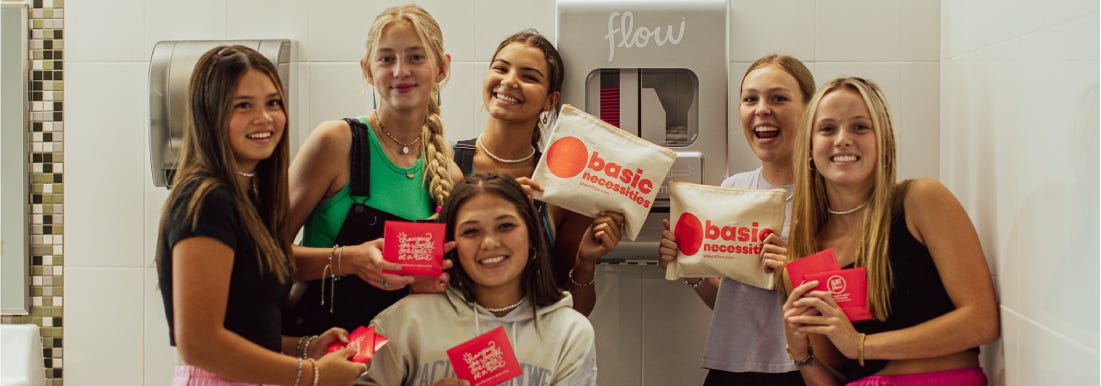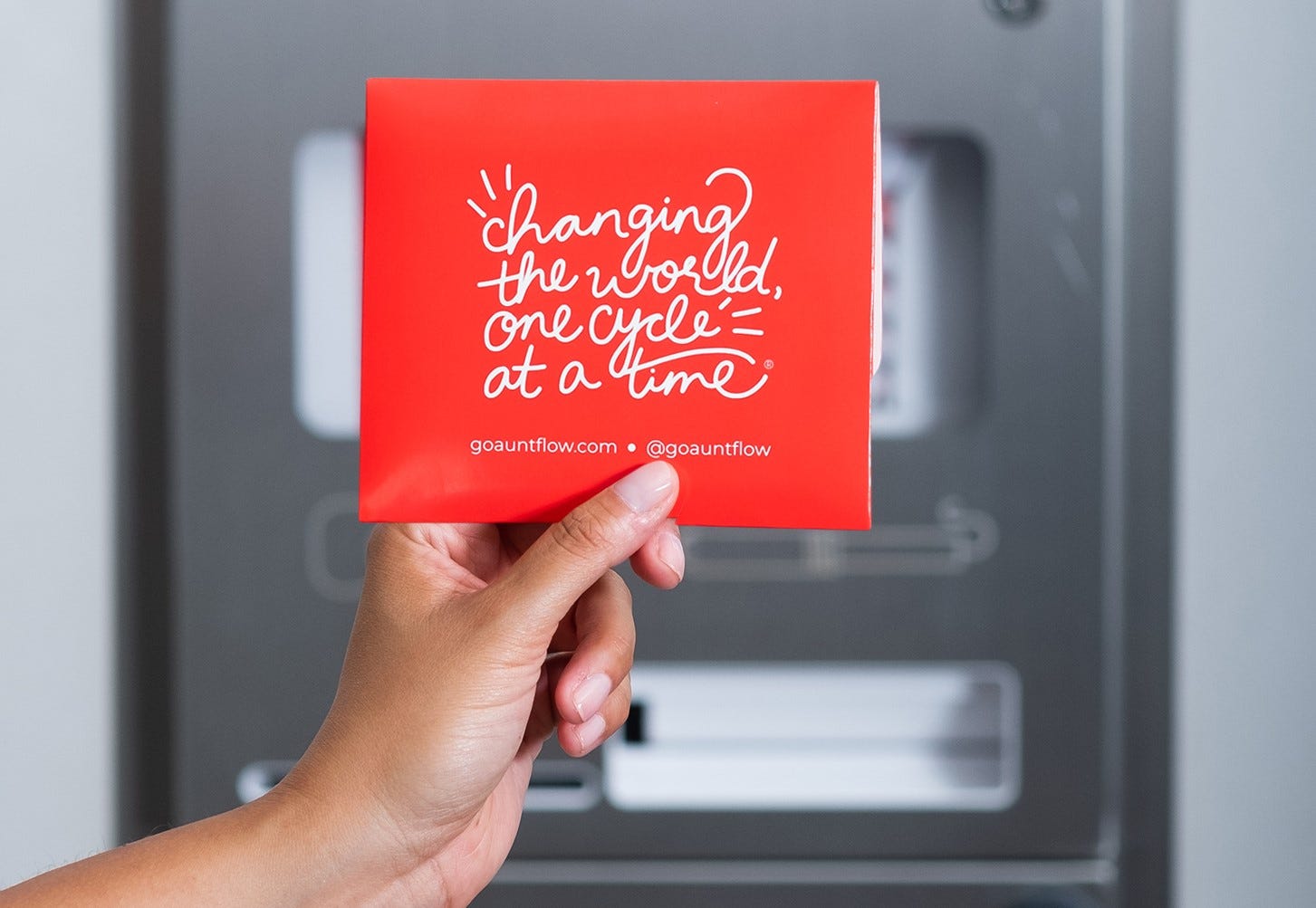

Across the country, legislation is driving the conversation on access to period products in schools, with many states passing laws requiring them to be provided for free. Studies show that nearly 1 in 4 students struggle to access period products (State of the Period 2023), which can negatively impact their education, health, and well-being. These initiatives acknowledge that period products are essential, not a luxury.
That’s where Aunt Flow comes in. As a certified woman-owned business, Aunt Flow is on a mission to ensure high-quality period products are freely accessible, championing the belief that “Toilet paper is offered for free. Why aren't pads and tampons?” Today, Aunt Flow products are stocked in over 600 schools nationwide—helping school districts prioritize student health, dignity, and academic success.
As of January 1, 2025, 28 states and the District of Columbia have enacted legislation requiring schools to provide free period products to students. However, the specifics of these laws vary, with differences in funding provisions and the grade levels affected.
Beyond passing legislation, where these products are placed within schools plays a crucial role in accessibility. Some schools debate whether to stock them in bathrooms or the nurse’s office, often citing concerns about restocking, vandalism, or theft. But to truly support students, period products should be available where they’re needed most—inside school bathrooms—ensuring easy, immediate, and stigma-free access.
The Benefits of Offering Free Period Products in Schools
Providing free period products in schools comes with several important benefits:
-
Supports student health, dignity, and attendance: 84% of teens have missed class or know someone who has missed it because they didn’t have access to menstrual products (State of the Period 2023). Ensuring students have access to necessary products helps them stay in school without unnecessary disruptions.
-
Reduces stigma around menstruation: Normalizing period products as everyday essentials helps eliminate shame and discomfort around the topic.
-
Aligns with similar initiatives like free toilet paper and soap in restrooms: Schools already provide other essential hygiene items—period products should be no different.
Why Location Matters: Bathroom Access vs. Nurse’s Office:
Even in schools that do provide period products, where those products are located matters. Many schools only offer menstrual products in the nurse’s office. The reality? Requiring students to visit the nurse’s office for period products can create unnecessary obstacles.
As Jennifer Christensen, Principal of Olympus High School in Salt Lake City, Utah, explains, 'Students in the past would have to come to the office or the counseling center, and they would have to come in and ask if they had any kind of period products. It would be scary and nerve-racking for a lot of students to come in and ask for anything they might need. I would say every school needs to have something easily, readily available for students.'
Barriers to access: Students may feel embarrassed asking for products, lose valuable class time, or face limitations on availability. In fact, 44% of teens report stress and embarrassment due to a lack of access to period products (State of the Period 2023).
Not to mention, sending students to the nurse’s office takes them out of class. If a student has to leave to get a pad or tampon, that’s time lost from valuable learning opportunities—just for something as simple as managing a period.
A more effective solution: Placing products in bathrooms allows for immediate, discreet, and equitable access, empowering students to manage their periods without disruption.
Addressing Concerns: Dispenser Maintenance, Restocking, and Respectful Usage
Some schools hesitate to place period products in bathrooms due to concerns about maintenance and misuse. Let’s dive into some proactive strategies that can help give schools some peace of mind!
Dispenser Maintenance and Restocking
Launching a free period program is a great first step—but long-term success depends on consistent upkeep. That’s where your maintenance and facilities teams come in—they’re the real MVPs!
Set them up for success by putting the right systems in place:
-
Set clear procedures and schedules for restocking, dispenser maintenance, and reordering.
-
Provide training for staff and establish protocols for responding to feedback.
-
Maintain open communication about supply levels and streamline access to reordering information.
Once you’ve completed staff training, keep your period program running smoothly:
-
Monitor usage patterns and adjust stocking levels accordingly.
-
Gather feedback from users (anonymous surveys work great!) and document any issues or complaints.
-
Track costs and optimize ordering to minimize waste.
Pro tip: Create a map of all dispenser locations to share with your facilities team—it makes restocking and maintenance much more efficient!
Encouraging Respectful Use
While overuse and vandalism are uncommon, they can occasionally occur in adolescent-heavy environments like K–12 schools—often simply because students are adjusting to something new in their bathrooms.
When period products are introduced, there may be initial curiosity or concern about scarcity. But once students trust that products will be consistently available, misuse tends to decrease. Educating students about the program and involving them in its rollout helps foster respect, reduce waste, and create a shared sense of responsibility.
Here are a few effective solutions:
-
Educational Signage: It’s vital to educate people on the importance of such products' accessibility and the importance of ensuring that they are not misused. Download Aunt Flow's signage to place next to your dispenser!
-
Education and Awareness: Language is power! Understanding and talking about the experiences of menstruators and the challenges associated with period poverty and menstrual equity can help form empathy and positive attitudes toward free-vend dispensers.
-
Bathroom Tours: Quite a few schools have led “school bathroom tours” once their Aunt Flow dispensers are implemented. That way, students can see the dispensers, learn how to use them, and dispose of products properly. Students love the “field trip” they get out of it and respect the products!
From Legislation to Implementation: Building a Sustainable Period Program
If your school is looking to comply with or implement policies regarding providing free period products, the first step is to understand the legislation in your state and then work with School Health to stock your bathrooms with Aunt Flow products.
Schools can take steps to implement sustainable programs by:
- Leverage funding and community support: Many schools don’t realize they can tap into existing federal and state funding—like Title I, Title IV, and McKinney-Vento—to cover the cost of period products. Beyond that, districts can apply for grants or partner with local organizations and education foundations to strengthen their programs.
- Create a consistent restocking plan: A sustainable program isn’t just about launching—it’s about keeping it running smoothly. That starts with building a plan for regular restocking, aligning with your facilities team, and budgeting for ongoing supply needs.
- Use plug-and-play implementation tools: Aunt Flow and School Health offer ready-to-use education kits, signage, and staff training materials that simplify rollout and help students access products without confusion or stigma.
- Track usage and measure impact: We provide tools to help schools track product usage, gather student feedback, and evaluate the program’s success—so you can report on impact and keep the program thriving.
Ready to get started? Aunt Flow and School Health are here to help you feel equipped and empowered for a period program at your school!



